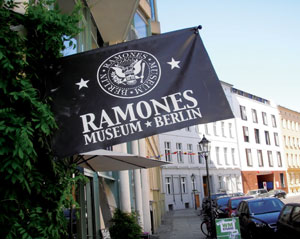LITERARY TRAVEL is the rage these days, with more and more people jonesing to infiltrate the haunts of their favorite authors. That said, the ever-changing European cultural megalopolis of Berlin offers one such opportunity.
On a nondescript side street in the central borough, Krausnickstrasse 23 to be exact, sits the Ramones Museum, a collection of more than 300 artifacts devoted to the game-changing New York punk band that existed from 1974 to 1996. For 3.50, visitors enter a small labyrinth of Ramones clothing, posters, news clippings, set lists, backstage passes, cardboard cutouts, skate decks, album covers, handbills, pinhead costumes and other related ephemera. The entire collection emerged from the efforts and obsessions of Florian Hayler, a local Ramones fanatic.
Dee Dee Ramone, the band’s original bass player and primary songwriter, spent some of his childhood in Berlin as an army brat. His mother was German, and his father was an American serviceman. His half-Germanness crept into several Ramones lyrics over the years.
The museum unfolds chronologically, including separate displays for each member of the band. Dee Dee’s section features all of his books, including his notorious 2000 autobiography, Lobotomy: Surviving the Ramones.
Even better, another glass case commemorates the last show Dee Dee played with the band before he quit, which took place at One Step Beyond in Santa Clara on July 5, 1989. I am proud to say I was at that show and Santa Clarans can be proud that their city is thus recognized by an international museum. But this is literary travel. Lobotomy, originally released in the United Kingdom as Poison Heart, begins with Dee Dee’s youth in Berlin. His father was a chronic alcoholic who regularly beat him. There was no familial unit, no emotional support, no nothing.
“I was disturbed,” he writes, describing his failure in the first grade. “I had anxiety problems; I had no self-esteem. I was embarrassed, because of the fighting in my family. And I had never been taught anything by an adult. I had absolutely no guidance. Everything was a mystery.”
Berlin itself is a city in constant flux. Dee Dee lived there for spells, before and after the wall went up in 1961. As a kid, he used to go wandering alone through bombed-out buildings.
Upon returning to Berlin later in the ’60s, he realized the wall went directly through his old ‘hood. Berlin was now a divided place, and he probably became a divided person, just like many of the natives.
Simply put, if one hails from a conflicted city, those conflicts often emerge in the person’s creative work. And Dee Dee often said that if he had to identify a real home, Berlin would be it.
In 1995, the final song on the final Ramones album was titled “Born to Die in Berlin,” penned by Dee Dee, even though he had long since left the band. The recording features him singing the bridge in German, which he submitted over the phone.
The man who essentially invented punk-rock bass playing also battled drugs for most of his life, beginning at an early age in Germany. Sadly, he lost that battle in June of 2002 in Los Angeles, dying of a heroin overdose at age 49—just four months after the Ramones were inducted into the Rock and Roll Hall of Fame and just days before he was supposed to play a solo gig at the Cactus Club in San Jose.
I contemplated it all during a long flight home on Air Berlin, which now flies straight from Germany to San Francisco. With all the vacuous, overdone “following in the footsteps” travel tours these days, Dee Dee’s dysfunctional upbringing should be required reading if one goes to Berlin.
After all, it was most likely his messed up childhood in that city that drove him to drugs, near-madness and criminal activity, which in turn drove him to help invent punk rock and change the entire face of music and influence thousands of bands worldwide for decades thereafter. Long live Berlin and long live Dee Dee Ramone.




